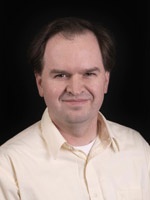
Distinguished Speaker Chris J. Myers from the University of Utah will give a talk on Tuesday, Oct. 24 as part of our CSE Colloquium Series. Attend the talk in Avery 115 from 4–5 p.m. There will also be a reception preceding the talk in Avery 348 from 3:30–4 p.m.
"A Standard-Enabled Workflow for Synthetic Biology"
A synthetic biology workflow is composed of data repositories that provide information about genetic parts, sequence-level design tools to compose these parts into circuits, visualization tools to depict these designs, genetic design tools to select parts to create systems, and modeling and simulation tools to evaluate alternative design choices. Data standards enable the ready exchange of information within such a workflow, allowing repositories and tools to be connected from a diversity of sources. This talk describes one such workflow that utilizes the growing ecosystem of software tools that support the Synthetic Biology Open Language (SBOL) to describe genetic designs, and the mature ecosystem of tools that support the Systems Biology Markup Language (SBML) to model these designs. In particular, this presentation will demonstrate a workflow using tools including SynBioHub, SBOLDesigner, and iBioSim.
SynBioHub (http://synbiohub.org) is a database designed for storing synthetic biology designs captured using the SBOL data model, and it provides both a RESTful API for computational access and a user-friendly web-based frontend. SBOLDesigner is a sequence editor that allows the designer to fetch parts for a SynBioHub repository and compose them to construct larger designs. Finally, iBioSim is genetic modeling, analysis, and design tool that provides a means to construct SBML models for these designs that can be simulated and analyzed using a variety of techniques. Both SBOLDesigner and iBioSim also support uploading these larger systems designs back to the SynBioHub repository. Finally, this talk will demonstrate how this workflow can be utilized to produce SBOL for the ACS Synthetic Biology journal, which has recently recommended the use of SBOL in their publications.
Speaker Bio:
Chris J. Myers received the B.S. degree in Electrical Engineering and Chinese history in 1991 from the California Institute of Technology, Pasadena, CA, and the M.S.E.E. and Ph.D. degrees from Stanford University, Stanford, CA, in 1993 and 1995, respectively. He is a Professor in the Department of Electrical and Computer Engineering, University of Utah, Salt Lake City, UT. Dr. Myers is the author of over 150 technical papers and the textbooks Asynchronous Circuit Design and Engineering Genetic Circuits. He is also a co-inventor on 4 patents. His research interests include asynchronous circuit design, formal verification of analog/mixed signal circuits and cyber-physical systems, and modeling, analysis, and design of genetic circuits. Dr. Myers received an NSF Fellowship in 1991, an NSF CAREER award in 1996, and best paper awards at the 1999 and 2007 Symposiums on Asynchronous Circuits and Systems. Dr. Myers is a Fellow of the IEEE, and he is a Member of the Editorial Board for ACS Synthetic Biology, Engineering Biology, Synthetic Biology, and IEEE Life Sciences Letters and has served on the Editorial Boards for the IEEE Transactions on VLSI Systems, IEEE Design & Test Magazine, and Springer journal on Formal Methods in System Design. Dr. Myers has also served as an editor for the Systems Biology Markup Language (SBML) standard and is on the steering committee for the Synthetic Biology Open Language (SBOL) standard.